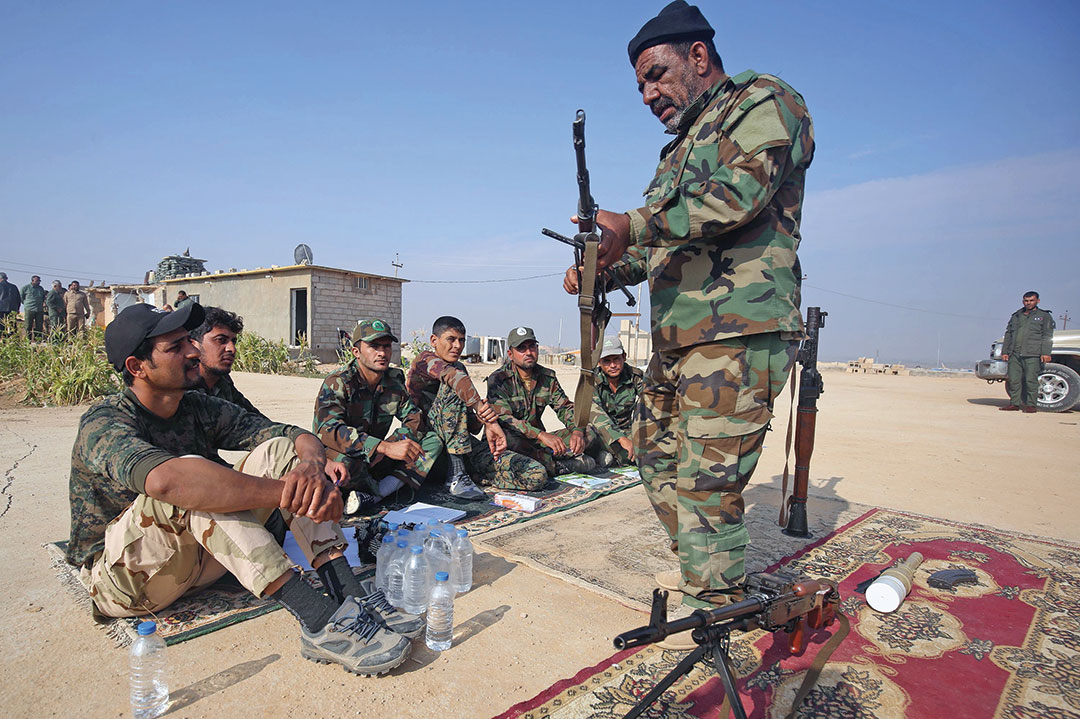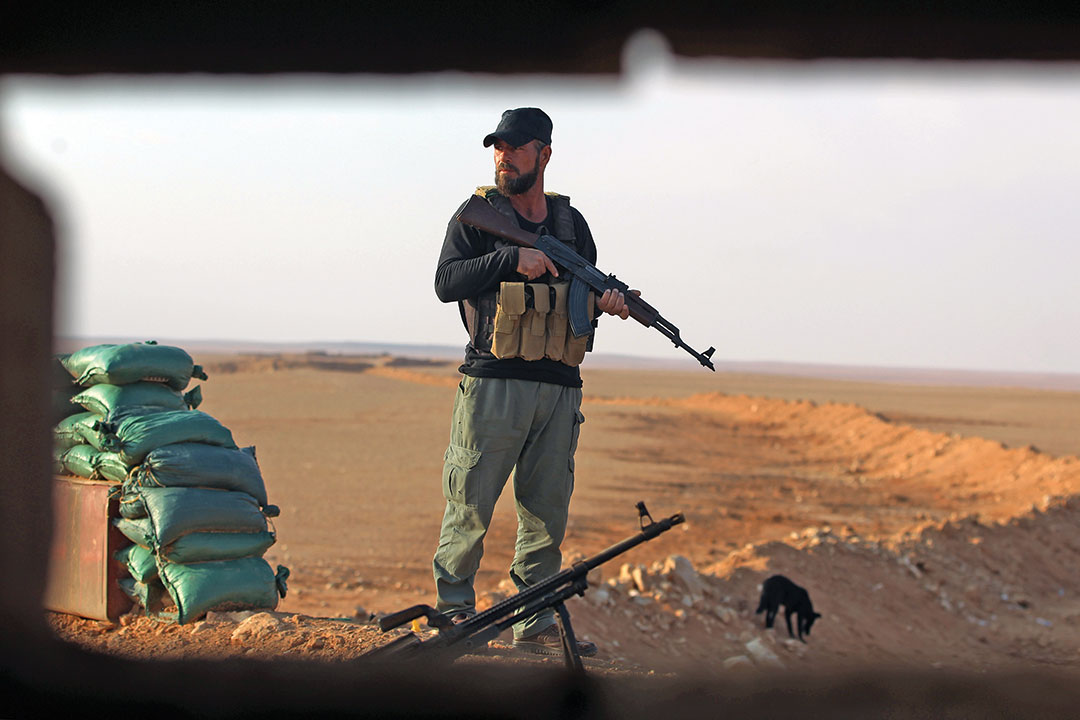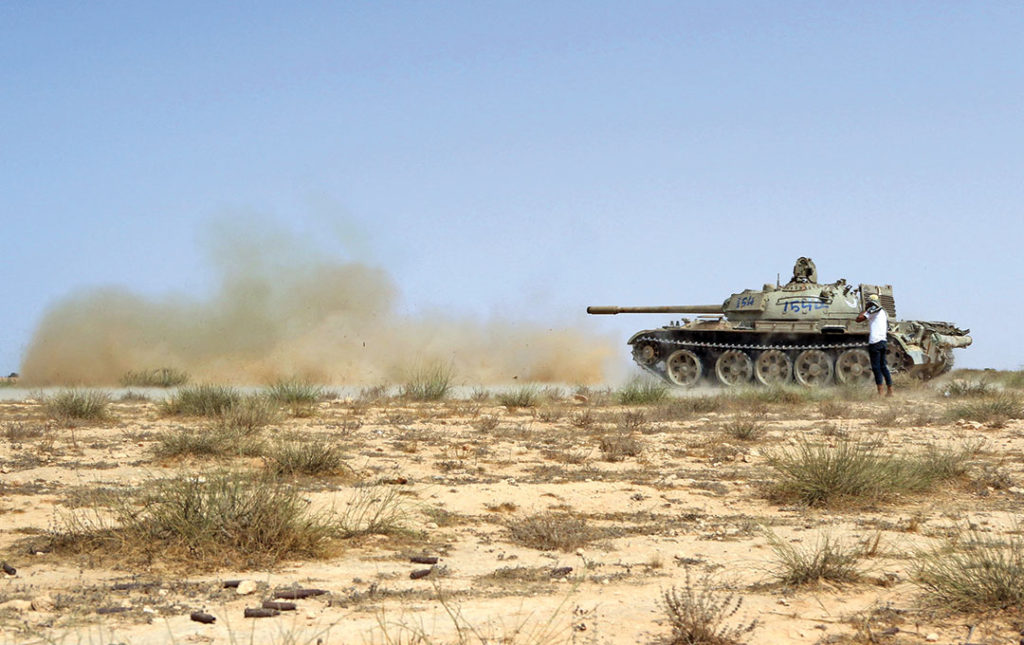An anti-extremist organization says the ISIS ‘handbook’ is based on distortions of the Quran
ADF STAFF | photos by AFP/GETTY IMAGES
In the name of Allah, ISIS fighters have committed unspeakable atrocities.
They have beheaded civilians. They have burned people alive. They have gang-raped children as young as 12 years old. They have not hesitated to slaughter women and children in a war against their enemies. Their enemies are, simply, anyone who is not among them.
ISIS murdered 1,700 fellow Muslims — young army recruits — in June 2014 at a former palace compound of Saddam Hussein near Tikrit, Iraq. ISIS made videos of the atrocity, showing columns of terrified young men marching at gunpoint toward mass graves that they could see were already filled with bodies. Others were marched down steps to a small dock on the Tigris River. Each recruit was dragged forward and shot in the head, with the body falling into the water along the blood-soaked riverbank.

ISIS fighters are Muslims, but what kind of interpretation of the Quran can possibly justify such horrors, encouraging Muslims to kill fellow Muslims?
Dating back to the early years of al-Qaida, extremists have relied on a book titled Management of Savagery. It was written by Islamist strategist Abu Bakr Naji and published on the internet in 2004. It outlines a strategy to exploit regions with weak governments and civil unrest. The ultimate goal was to bring an end to the Saudi monarchy, with al-Qaida taking control of the religious capital of Mecca.
ISIS, however, relies on a Salafist-inspired work called the Fiqh al-Dima, or The Jurisprudence of Blood. The 579-page book lays out an interpretation of the Quran that supposedly justifies atrocities such as beheadings and slavery. It also serves as an operational manual for jihadists.
The manual clearly advocates the “indiscriminate killing” of perceived enemies and encourages extremists to use any means necessary to “snatch away their souls, drive their spirits from their bodies, cleanse the earth from their filth.”

Quilliam, a group that describes itself as “the world’s first counter-extremism organization,” spent two years examining and transcribing the ISIS book. In 2018, it produced a detailed theological rebuttal of ISIS’ “twisted” interpretation of Islamic teachings called Tackling Terror: A Response to Takfir Terrorist Theology, by Salah Al-Ansari and Usama Hasan.
“There is a startling lack of study and concern regarding this abhorrent and dangerous text in almost all western and Arab scholarship,” says the rebuttal. “We hope to expose and deconstruct this unprepossessing yet deeply insidious and pernicious text.”
A HISTORY OF MISINTERPRETATION
The authors point out that misinterpretations of the Quran are almost as old as the Quran itself. They quote a Quranic scholar from 1,300 years ago who said, “Learn before you practice your religion, as those who practice without learning usually become so fanatical that killing becomes an essential part of their behavior.”
In modern times, the authors say, Islam has a wide array of interpretations and schools of thought — as is the case with any religion.
“When a terror attack occurs, two loud voices unfailingly emerge: Muslims and non-Muslims alike who deny that this has anything to do with the Islamic faith, and far-right populists who seek to paint all Muslims as terrorists,” the authors note. “The Islamic extremists nod along in agreement, since they believe God sanctions such acts of terror.”
Quilliam says ISIS ideology begins with the principle of “excommunicating” all existing political regimes, as they are not implementing the true teachings of Islam and have fallen into a trap of “pre-Islamic ignorance.” ISIS followers are therefore entitled to fight all unbelievers and attack all non-Muslim countries of the world that do not have a treaty with them. They believe this must continue until Islam becomes the only dominant faith.

With this as its goal, the ISIS manual legitimizes assassinations, kidnapping, the taking of hostages, suicide operations, mutilating corpses, beheadings, killing children and nonfighters, taking sex slaves, trading in human organs, using weapons of mass destruction, and genocide.
Quilliam says there are some basic principles underpinning the traditional, correct Islamic interpretations of jihad:
The Quran teaches that jihad is a lifelong, nonviolent struggle for goodness, justice and truth against evil, injustice and falsehood.
During his 13-year mission in Mecca, the Prophet Muhammad and his followers were subjected to persecution but were ordered to remain patient and nonviolent. During that time, the Prophet’s followers were tortured and killed, but the response was to remain peaceful and nonviolent.
During the Prophet’s 10-year mission in Medina, military jihad in self-defense eventually was allowed.
Military jihad can be declared only by a legitimate authority. In modern times, this means that only legitimate governments have the authority to declare a state of war or military jihad. Vigilante or nonstate actors such as terrorist groups have no Islamic authority to issue a call to arms in the name of jihad.
Military jihad also was legislated to protect and promote religious freedom. Muslims are permitted to protect the religious freedom of Muslims, Jews and Christians.
Military jihad always has been tempered by strong ethical restrictions.
The Prophet spoke of the obligation to avoid killing women, children, old people, peasants, monks and others in war. Muhammad further banned chopping down trees, burning orchards, or poisoning wells or other water supplies in war. “These teachings may be seen as Islamic forerunners to modern warfare ethics, such as the Geneva Conventions, that are also Islamic in spirit and must be seen as binding upon Muslims worldwide,” Quilliam says.
“The best jihad is to speak a word of truth before a tyrant ruler,” the Prophet said. Jihad is thus a universal struggle for good against evil.
The outer jihad — the struggle for goodness and truth in the world — is always underpinned by inner jihad, which is the struggle against the self’s base desires.
All charitable efforts or struggles by Muslims today for goodness, truth and justice against evil and injustice can be termed jihad.
A THREAT TO THE WORLD
Quilliam says the ISIS manual defines jihad as a declaration of war on all those who are not Muslim and live outside the Islamic territory, until they convert to Islam, accept the role of Muslims governing them, or pay a non-Muslim tax as signs of their submission. The authors say that such an interpretation represents a threat to any international world order, because it adopts a borderless territory policy that will be implemented with endless wars.
The authors point out instances in the manual where Quran passages are clearly taken out of context. A reference to people in one passage is interpreted to mean all people, when, in fact, it refers only to a specific group of conquerors from Muhammad’s time.
“One of the key mistakes of the author of this ISIS book, and the ideology that belies it, is the focus on the particulars of Islamic law and ignoring the governing ethics, philosophy and principles,” Quilliam says. That clears ISIS to isolate one piece of text “to support an argument and at the same time, negate the Quran.”
The authors specifically address weapons of mass destruction in their study, describing them as anything that causes indiscriminate killing, such as setting fire to an entire village. Such weapons, they write, do not permit a level of discrimination between fighters and noncombatants and are banned by the Quran.
The Quran requires that civilians go unharmed under its rules of engagement. Quilliam says that even if weapons of mass destruction could be used strictly against military targets, they kill and maim in such horrible ways that they violate Islamic teachings on fighting humanely. And lastly, they say, such weapons cause lasting damage to the environment, “a result that must be considered in Islamic moral evaluations because all life has worth as God’s creation, notwithstanding any utility derived by humans.”
SCHOLARS DENOUNCE EXTREMISTS
The Quilliam authors are not the first Muslim scholars to condemn extremists. In 2010, Islamic scholar Muhammad Tahir-ul-Qadri issued a 600-page fatwa that said Muslim terrorists are bound for hell.
A fatwa is a religious opinion regarding Islamic law issued by an Islamic scholar. It is often issued to raise awareness and provide clarification regarding a specific issue for Muslims, who then may or may not follow it.
In the bluntest of language, Dr. Tahir-ul-Qadri said his research proved that “the killing of Muslims and the perpetration of terrorism are not only unlawful and forbidden in Islam, but also represent the rejection of faith.” His fatwa was necessary, he said, because in the minds of some Westerners, Islam and terrorism had become synonymous. A summary of Fatwa on Suicide Bombings and Terrorism concluded, “Suicide bombings and attacks against civilian targets are not only condemned by Islam, but render the perpetrators totally out of the fold of Islam.”
Also in 2010, a federation of leading Muslim scholars convened in Mardin, Turkey, to study a fatwa issued by 14th century scholar Ibn Taymiyya that had long been misinterpreted. The 15 scholars from countries throughout the Muslim world, including India, Indonesia, Iran, Kuwait, Morocco, Saudi Arabia, Senegal and Turkey, said that the fatwa, used by radicals to justify killing in the name of Islam, could not be used to justify terrorism in a modern world that respects faith and civil rights. The same year, Saudi Arabia’s Council of Senior Scholars issued a fatwa, citing the Quran as stating that financing terrorism is a violation of, and punishable under, Islamic law.
But Tahir-ul-Qadri’s fatwa stood out in terms of its research and detail. The fatwa, since published as a book, includes references from the Quran, the Hadith, the opinions of the Companions of the Prophet, and “the widely accepted classical texts of Islamic scholarship.”
The fatwa condemns terrorism, but it goes a step further in criticizing those Muslims who do not speak up in opposition to violence. “There is no denying the fact that the vast majority of Muslims oppose and condemn terrorism in unequivocal terms and are not ready to accept it as even remotely related to Islam in any manner,” Tahir-ul-Qadri wrote.
“The killing of Muslims and the perpetration of terrorism are not only unlawful and forbidden in Islam but also represent the rejection of faith,” he wrote. “It has been established that all the learned authorities have held the same opinion about terrorism in the 1,400-year history of Islam.”
Tahir-ul-Qadri was specific when it came to listing those people who Muslims can justifiably kill: enemy soldiers in times of war, and no one else.
Perhaps predictably, the Pakistan-based militant Islamic group Tehrik-e-Taliban added ul-Qadri to its death list after his fatwa was published.

